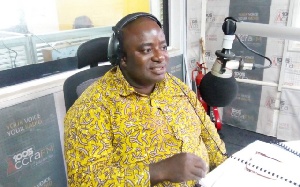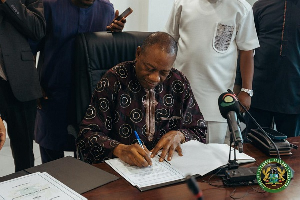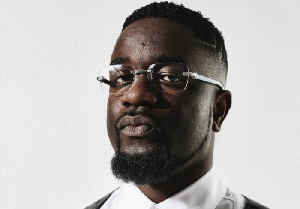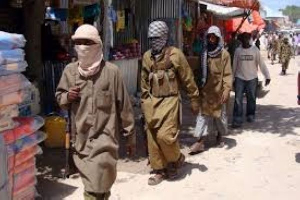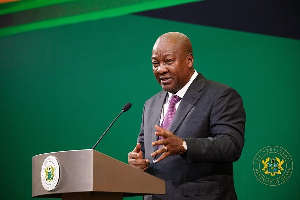Against the backdrop of the Ivorian raid of a northern Ghanaian village and the sudden entry of Dafur ?refugees?, this article seeks to point to the weak security structures we have in place. After the fact, we see security agencies waking up and holding meetings to evaluate our security position. This is reactionary.
This is shortsightedness and once again speaks volumes to our reactionary method of management as opposed to the proactive position required to make strides. A sign of the lack of objective management principles in our daily operations.
Many have discussed Ghana?s security over time. The impact of poor security has very far-reaching consequences of economic and personal interest.
Considering the nature of our region, we should have had intelligence officers especially on all sides of our borders, who would be able to communicate everyday on activities. It would be more of a data collection exercise on their part, which should be sent daily to experts on security analysis in Accra or at vantage regional points. This information would be analyzed, decoded and then measured against any activity that is happening outside the norm.
On a weekly basis, there should be a security briefing on all fronts with all the security agencies having access to intelligence provided, with our president participating and being part of this important process.
From the backtracking happening now, it is evident that there is no such system. The security apparatus with respect to both incidents obviously were oblivious to the issues leading to these events, till it became public knowledge.
The Ghanaian paid a price again for incompetence. We have waited for our citizens to be victimized before taken action.
The Fulani herdsmen?s aggression all over the country is another source of worry, which will be the next explosive issue, because of governments failure to provide adequate information to citizens with respect to its position on the matter and what policies exist to protect citizens. Their activities also constitute a form of foreign aggression. What are we doing about it? These folks are dangerous from the fact that they are armed and roam. Who knows what else they do apart from the cattle they herd? In the name of ECOWAS protocol, we have let these Fulani folks also inflict harm on our citizens. If one?s government cannot offer protection, are we asking for people to take the law into their hands? Without a solid plan, we are pursuing a ?band-aid? approach on all fronts.
As a result of the latest two incidents, the Dafur refugee issue and the Ivorian ?invasion?, so to speak, assuming we move security personnel to these areas now, this leaves less security personnel in other areas. The armed robbers then have a field day and the cycle continues. What is the grand security action plan? Is there one? What kind of recruitment is needed for the agencies in terms of future projections with respect to crime? What is the needed ratio of security personnel to citizens and where are we now?
We may not know as matters of security are sensitive but we would hope that this government is fully aware of the fact that our national security falls short of expectation and that all this talk of investment climate, peaceful environment is nothing short of naivety, if we do not have a solid action plan.
When one reads the article, Security Alert ? Intelligence Chiefs Hold Crucial Talks, posted on Ghanaweb, http://www.ghanaweb.com/GhanaHomePage/NewsArchive/artikel.php?ID=79747 One wonders what quality of people are running this country? Imagine a DCE who states that they were told this is a UN action so they did all that is cited in the article, without informing the appropriate government personnel in Accra? Does the DCE work for the UN or the Ghana government? Does he know his role? The scary part is how many DCE?s would have done the same thing in such a situation due to a lack of training with respect to their job and expectation?
One can go on, but if democracy should succeed and really bring about the success Ghanaians are seeking, it must be noted that the system is failing our people and real change is needed.
The action of the DCE also speaks volumes, because the caliber of personnel and the benchmark used to select DCE?s, who are actually supposed to be the champions of democracy at the grassroots is quite poor. It is my hope that in the next republic if not now, we spend more time vetting DCE?s and do a very tough job at it since their role in terms of development is so critical.
Getting back to the security issue, Ghana continues to be caught between ?a rock and a hard place? as we are still surrounded by conflict. We also have our own internal conflicts. The Togo issue now presents many unknowns, we have criminals and bandits also running around freely, laws that are broken, lack of logistics for security personnel, poor communication technology to create a network for rapid information movement to assist security personnel, corrupt judges and a lack of judicial facilities to effectively provide swift justice. If we want to believe it, we also have a proliferation of arms, without any public policy on arms control and management. We have a problem.
We do not have strong leadership willing to think outside the box. An example of this is as follows: Recently there have been many highway robberies at night: why can the government, not impose on the VANEF STC late bus schedules, two armed police on each bus and charge the company for these services. It is important that if private enterprise does not get the relationship between security and economic impact, government takes steps to ensure that people are safe and we do not allow meager profits of any private enterprise to get in the way of creating poor image for the overall economy and national security.
One needs to look at the American experience with respect to events of 9/11 and especially after. One needs to look at the extent of government regulation imposed on the private US airline industry. They have been hard for both passengers and airlines but the government of the US understands what it needs to do so as to mitigate anything of this nature from happening again. It also knows that for most private enterprise, profits is what they seek and an added cost may not be necessarily embraced voluntarily, thus their mandates. It also takes the life of each citizen, be it American or otherwise seriously. Where do we stand in Ghana?
The security issue is a big one and it needs to be brought to the forefront of policy and budgetary issues. The perception and reality both have impact, so we need to get real and understand that all matters of security feed into other aspects of economic development and we need to be able to put real structures in place to prevent or mitigate some of these lapses we are seeing today. We have a lot of work to do.



